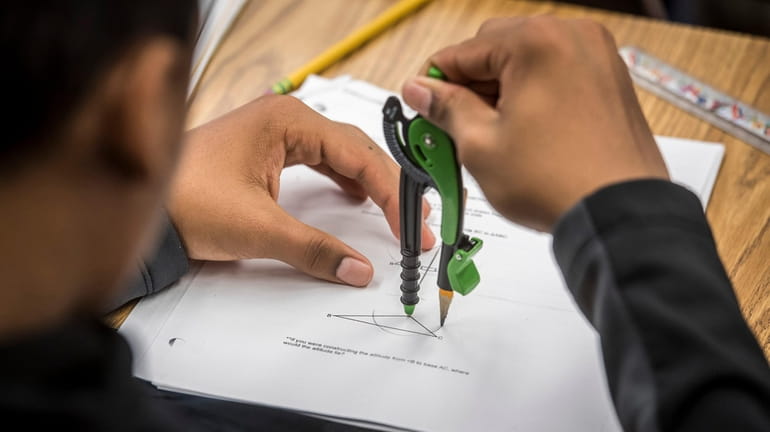Regents exams are not the obstacle to improving graduation rates

High-quality tests are very nearly the only way learning can be measured evenly from student to student, school to school, and district to district. Credit: Newsday/J. Conrad Williams Jr.
In July 2019, New York’s Board of Regents announced that it would create a Blue Ribbon Commission to review the state’s high school graduation requirements. The end goal is a reconsideration of how diplomas should be awarded in New York, and what those certificates should validate “to ensure educational excellence and equity for every student in the state.”
Much of what we teach is outdated, and much of how we teach is hidebound. Both our tests and our curricula are imperfect. But state tests are also the most tamper-proof and objective measure we have of student achievement, and students won't be well-served by abandoning them.
Earlier this month, the first significant result of that process, a report prepared for the Regents by WestEd, a San Francisco-based research agency, was released.
The headline of the report was yet another attack on traditional, objective tests, in this case the state’s Regents exams, as yardsticks for measuring student achievement. Many of the educators, parents and officials who gave input said that the exams, required to graduate high school in New York for 140 years, ought to be eliminated or have a dramatically reduced role in bestowing diplomas. The report comes as students are having an ever-harder time passing the subject-matter exams even as the grading curve and the score needed for passing have been made easier. Meanwhile, evidence of COVID-19 learning loss grows daily.
CHANGE IS NEEDED
The attacks on the Regents exams are expected. The Blue Ribbon commission was created by Regents who side with teachers unions consistently opposed to high-stakes tests. But the report also made highly constructive points that, properly pursued, could bring needed change.
Students generally don’t need to be released from the rigor of high-quality tests, which are very nearly the only way learning can be measured evenly from student to student, school to school, and district to district. But curricula and diploma requirements do need to recognize that the world in which we educate students has changed dramatically. Skills and competencies unheard of 50 years ago now are crucial, while some traditional requirements have lost relevance. Not every student must be pointed toward a four-year liberal arts education, if a direct job path suits them better. But they all must have basic skills to function in this more complex world.
The report came from a study of literature and respondent opinions on what students ought to know and how that ought to be measured, as well as practices in some other states and nations.
Throughout the report, what’s most clear is how much is unclear. Education policy has always been the place the concept of evidence-based best practices goes to die. Some high-performing states and nations have firm, objective testing standards as bars to graduation, while others don’t. What’s obvious from the literature is that the greatest indicator of learning success is always the relative wealth and education of the adult populace of each locale. And the stakeholder responses varied so widely that it was hard to draw firm conclusions as to views of New Yorkers on graduation testing.
Parents and educators called too often for replacing testing with highly subjective shows of competence like PowerPoint presentations, essays, posters and portfolios. Worse, it’s hard with such assignments to be certain the students did the work.
ROOM FOR IMPROVEMENT
One thing the study did show: Other places outpace New York both in helping students see and pursue career and technical paths that motivate them, and on creating dual paths that combine such vocational education with study of classical subjects. Other regions have also been quicker to add financial and technological literacy to curricula. And an emphasis on civic education, on how society and government are designed to work and the proper role of a citizen, is stressed in other nations, and sorely missed here.
Other needs frequently cited, particularly in the surveys, included social and emotional learning, “the whole child,” and traits like kindness and empathy and self-assuredness and collaboration. All are surely important, but it also leads to the question: Can the schools where kids spend seven hours a day, 180 days a year, be held responsible for teaching them every needed trait and skill?
The necessity of stressing career and technical paths also highlights another hard truth: Teaching students to prepare for and comfortably take high-stakes tests is absolutely crucial for prospective doctors, nurses, lawyers, engineers, teachers, professors, cops, firefighters, most any civil servant, stockbrokers, plumbers, electricians, real estate agents, IT professionals, and those working in numerous other careers.
It is frightening and frustrating to contemplate jettisoning objective standards when too many kids already were struggling academically before the pandemic, and the problems are worse since. A switch to more subjective measures risks graduation rates increasing even as standards are lowered. That would leave the shortcomings of students and schools undetected and ignored, and fixes unfunded.
We don’t owe the next generation diplomas, we owe them proper educations. Tests are not a “barrier” to graduation, they’re what signifies it’s an actual accomplishment. There is room for significant changes in both what we teach students, and how we teach it, and even how they prove they learned it. But right now, in New York, the Regents tests are not the problem with our high schools, or our high schoolers.
The exams are telling us there is a problem.
That’s why they’re under attack.
MEMBERS OF THE EDITORIAL BOARD are experienced journalists who offer reasoned opinions, based on facts, to encourage informed debate about the issues facing our community.
